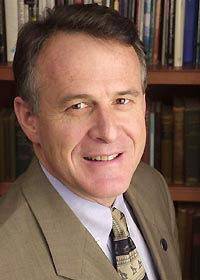|
This is an archived article.
For the latest news, go to the
Advance Homepage
For more archives, go to the Advance Archive/Search Page. | |||
As the Academic Plan Task Force moves ahead, I urge the University community to stay involved. The Academic Plan task force has reached its first significant milestone in the completion of the Academic Plan. On Feb. 28, the task force submitted for review a draft of a number of major pieces of the document; these can be viewed on the academic plan website.
The Academic Plan will serve as a road map for focusing UConn's academic and building program activities in the next decade. My charge to the task force when it began its work last fall was "to provide a set of planning principles and objectives to assist University of Connecticut trustees, administration, and faculty as they decide on academic priorities, capital projects, and the allocation of resources in the coming decade." The guiding principles of the Academic Plan will allow the University to capitalize on strengths and allow for informed decision-making concerning the University's ability to serve the higher education needs of the citizens of Connecticut. To date, the process of developing this important document is on schedule. The main focus of the draft document submitted by the task force is an outline of the six Areas of Emphasis that will act as the guiding principles for the other components of the report. These areas of emphasis were initially developed by the task force and were further refined with input gathered from deans, department heads, faculty, students, and other interested parties. As mentioned in the draft document, these principles will focus the University's resources to achieve excellence and recognition in Connecticut, the nation, and the world, and will guide the prioritization of the building program for 21st Century UConn and for other resource allocation activities. To date, there has been some lively discussion related to the areas of emphasis. For instance, there has been some feedback that there is too much focus being placed on external funding, as well as vigorous discussion on the proposed guidelines for the Chancellor's Competition for additional funding of selected projects. I believe healthy and productive exchange is necessary in the development of this report, and I am encouraged that so many individuals are taking an active role in this process. This type of constructive debate is essential to the task force's success in generating a comprehensive plan. I urge everyone to continue to provide feedback, especially now, as the task force begins its next phase of plan development. The next significant deadline for the task force is May 1, at which time the draft of the report will be complete. It is anticipated that this draft document will be presented to the Board of Trustees at its meeting on July 22. As mentioned in early fall, I had envisioned that this process would be collaborative and inclusive. The task force solicited feedback and took that input under consideration in the development of the plan. The task force maintains web pages as part of the Chancellor's website, and I suggest that you visit these pages frequently as the plan continues to evolve. We are planning more open forums similar to the one held in February, to provide public opportunities for feedback on progress to date. Additionally, Karla Fox (karla.fox@uconn.edu) and Dick Brown (richard.d.brown@ uconn.edu), task force co-chairs, can be reached directly by e-mail with your comments and feedback. I appreciate the energy put forth by the task force, as it works to develop the Academic Plan. I also appreciate the broad-based input provided by members of the University community in assisting the task force in refining the Plan. I look forward to the final draft and its future implementation. Detailed information on the components of the Academic Plan, the task force, the schedule of meetings, and other pertinent data can be found at: academicplan.uconn.edu/. |

